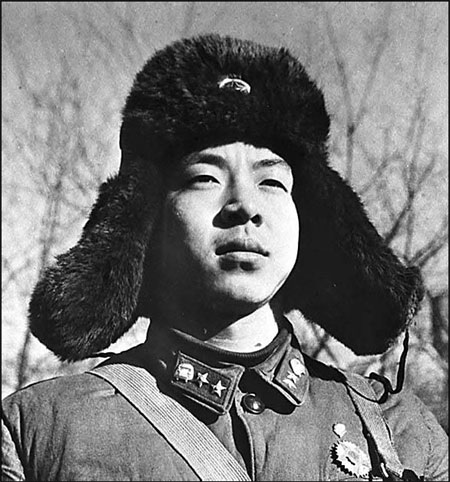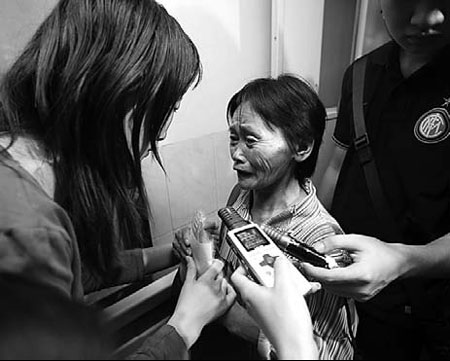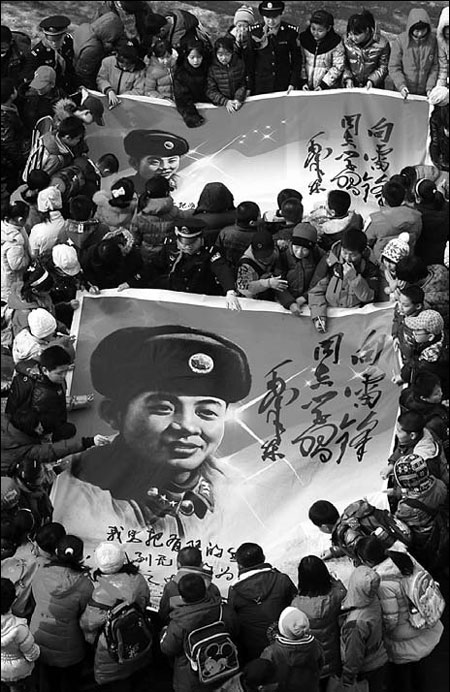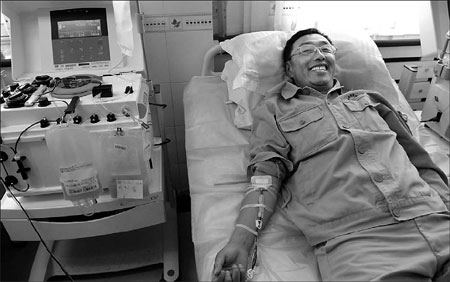Lei Feng continues to lead by unselfish and heroic example
Updated: 2012-03-05 08:07
By Wu Wencong and Feng Zhiwei (China Daily)
|
||||||||
|
The classic image of Lei Feng, an altruistic icon for the past five decades. Xinhua file |
|
Chen Xianmei (right) received 20,000 yuan for being the only person to help Yue Yue, the toddler who was hit by two vehicles in Shenzhen last year. Here, she hands over part of the cash to Yue Yue's mother on Oct 18. Cai Hong / for China Daily |
|
Students from Lingxi Primary School in Shenyang, Liaoning, sign their names on posters of Lei Feng, part of an activity to start the new semester, on March 1. Cai Bing / Xinhua |
|
Guo Mingyi, a 53-year-old steel worker in Liaoning province, was honored by the Communist Party of China as a "modern-day Lei Feng" on Friday, three days ahead of the annual Learn from Lei Feng Day. The honor was given to Guo for helping others by donating more than 60,000 milliliters of blood. Su Zhongchuang / China News Service |
Nation looks to altruistic icon for inspiration amid period of self-reflection, Wu Wencong and Feng Zhiwei in Changsha report.
The iconic image of Lei Feng shows him standing in full army uniform and holding a rifle. Gazing into the distance, his face displays a thoughtful determination to protect his people against any danger.
This year, the country will mark the 50th anniversary of his death. Yet, the lessons offered by this guardian of morality are arguably more important today than ever.
With many people still reeling from several shocking events in 2011, including the death of a 2-year-old girl who was ignored by passers-by after being run over, authorities are evoking the spirit of the legendary figure to encourage altruism.
"As our society has developed we've ... seen the loss of good faith and distortions in our values," Luo Shugang, executive deputy head of the publicity department for the Central Committee of the Communist Party of China, told a news conference in Beijing recently. "To solve these issues, we must look to Lei Feng."
In addition to emphasizing the hero's nobility, however, officials nationwide are introducing controversial legislation to promote and protect modern-day role models.
Lei Feng was born in 1940 to a poor family in Changsha, Hunan province. After being orphaned at the age of 7, he was cared for by the local government and was enrolled at a primary school three years later.
It is said he arrived early every day to clean the classroom before lessons, an early sign of his charitable nature.
He received six years of education before ending his studies to become a farmer, as developing China's agriculture was a key priority for the Party. He also contributed in several areas with various work units.
At the age of 20, Lei joined the People's Liberation Army. Despite being just 1.6 meters tall, which is below the height limit, he was enlisted based on his good performance and was stationed in Fushun, Liaoning province. He was also made a Party member.
During military service, he is said to have washed his comrades' clothes and given them free haircuts, as well as given away money and possessions to people in need. When he traveled on trains, he gave his seat to elderly passengers, and helped stewards to sweep up.
"If you take time to learn about his life and the help he received from the Party and kind-hearted people, it's not hard to understand his love for the Party and the people, or his motivation," said Liu Xiaoyun, 25, a tour guide at the Changsha Lei Feng Memorial Hall.
Lei Feng's life was tragically cut short in 1962, when he was hit by a telegraph pole that was felled by a reversing army truck he was directing. However, his memory has lived on.
Great loss
Social morality has been a hot topic since early last year, when a series of news stories appeared to highlight the unwillingness among bystanders to help people in need.
Many incidents involved elderly people falling to the ground, including an 88-year-old man who choked to death as people looked on.
Arguably the most shocking was the case of Wang Yue, the toddler who was ignored by 18 passers-by after being run over by two vehicles in Shenzhen, Guangdong province. Video footage taken by surveillance cameras was posted online in mid-October and caused outrage. The 2-year-old girl, known more commonly by her nickname Yue Yue, died in hospital several days later.
The news resulted in media commentators, Web users and sociologists joining to lament the loss of social values in China.
Ever since, the government has been pushing the message of altruism, with several regional authorities even introducing policies to promote the need for role models.
Last month, officials in Changsha, Lei Feng's home city, announced that decisions about recruitment as well as employee medical benefits and housing will now favor candidates with strong charitable backgrounds.
Days earlier, Guangzhou also released a draft regulation for public consultation that said people who return lost money will get 10 percent as a reward.
Opinion has so far been divided on the policies.
A commentary piece published by Weifang Evening News in East China's Shandong province on Feb 20 read: "Morality has nothing to do with material interests. Chen Xianmei, the trash collector who was the only person to try and help Yue Yue didn't lend a hand for the sake of a reward.
"If someone does good deeds just for the reward, it has nothing to do with morality. It's simply a business deal," it read.
Liu at the Lei Feng Memorial Hall disagreed, however, and argued that people need to have "the ability to help others" before they can lend a hand.
Tan Huangfang, his 52-year-old former colleague, added: "If all people get for helping is a certificate that says what a good person they are, others are not going to want to follow in their footsteps. That goes especially for those who are injured in the act of doing good deeds.
"What we need to publicize is not only to do good deeds and be a nice person, but also the notion that good people always get rewards," said the retired tour guide, who worked at the memorial hall from 1986 until 2009.
Legal aid
In the face of criticism, the Changsha authority said its policy may have been misinterpreted by the media. However, it said that material rewards are just as vital as the happiness someone gets from the knowledge they did something good.
"For those who make significant contributions, especially those severely injured or killed helping others, why shouldn't we help them or their family?" said Yang Changjiang, deputy publicity director for the city's Party committee.
Officials are also attempting to address what many argue is the root cause of people's reluctance to intervene in incidents: The fear of being blamed and sued.
After the death of Yue Yue, Shenzhen released a draft regulation that, if approved, will protect the interests of good Samaritans, making them exempt from responsibility when things go wrong, as long as there is no evidence of negligence or deliberate sabotage.
If an accusation is made, claimants must produce solid proof against the good Samaritan, while false claims can result in prosecution, the draft states.
This would prevent cases such as the one in June that saw Xu Yunhe ordered to pay more than 100,000 yuan ($15,800) to an elderly woman he helped after she fell down 5 meters away from his car in Tianjin. Despite a lack of evidence, the judge said the plaintiff's fall was "definitely influenced by the car somehow".
Shenzhen's draft regulation has won support from the majority of the public, the authority said.
In Western nations such as the United States and Canada, laws protecting good Samaritans who intervene in incidents resulting in injury or death have been in place since the late 1950s.
In a research paper on the legislative issues in salvage operations, Zhou Chengxin writes: "The US is the typical example of the common law system, which is mostly made up by case law. However, the Good Samaritan Law is written law, which shows how important it is to the country."
The director of the research institute under Shenzhen's legislative affairs office goes on to add that China has no similar laws or regulations, which results in difficult cases in which "rescuers shed tears after shedding blood".
Although the draft regulation has now completed the consultation stage, Zhou told China Daily on Thursday that it is still unclear what step will be taken next.
Huang Yuli in Shenzhen and Yang Wanli in Beijing contributed to this story.
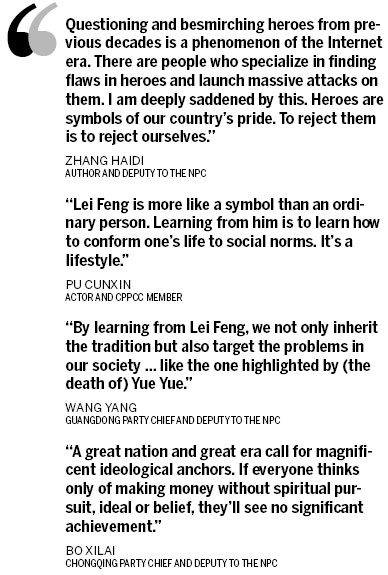
(China Daily 03/05/2012 page1)

 Relief reaches isolated village
Relief reaches isolated village
 Rainfall poses new threats to quake-hit region
Rainfall poses new threats to quake-hit region
 Funerals begin for Boston bombing victims
Funerals begin for Boston bombing victims
 Quake takeaway from China's Air Force
Quake takeaway from China's Air Force
 Obama celebrates young inventors at science fair
Obama celebrates young inventors at science fair
 Earth Day marked around the world
Earth Day marked around the world
 Volunteer team helping students find sense of normalcy
Volunteer team helping students find sense of normalcy
 Ethnic groups quick to join rescue efforts
Ethnic groups quick to join rescue efforts
Most Viewed
Editor's Picks

|

|

|

|

|

|
Today's Top News
Health new priority for quake zone
Xi meets US top military officer
Japan's boats driven out of Diaoyu
China mulls online shopping legislation
Bird flu death toll rises to 22
Putin appoints new ambassador to China
Japanese ships blocked from Diaoyu Islands
Inspired by Guan, more Chinese pick up golf
US Weekly

|

|
